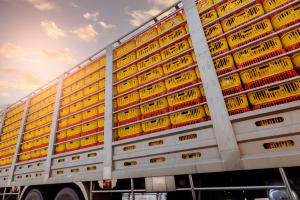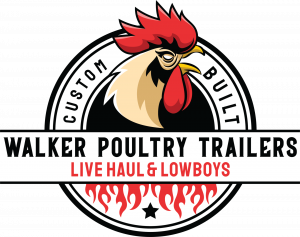Corrosion Resistance in Live-Haul Trailers: Materials, Coatings, and Long-Term Performance
When live-haul trailers last longer, fleets operate more efficiently, and producers stay on schedule. ”
PHILADELPHIA, MS, UNITED STATES, November 6, 2025 /EINPresswire.com/ -- Corrosion remains one of the most persistent challenges in the poultry transportation industry. Live-haul trailers are constantly exposed to harsh environmental and biological conditions that accelerate metal degradation and structural fatigue. Addressing this issue requires an understanding of material science, coating technology, and long-term performance strategies that extend equipment lifespan and maintain operational efficiency.— Dwayne Walker
Walker Poultry Trailers, a leader in custom-built live-haul equipment, has focused extensive research and development on corrosion resistance for poultry transportation fleets operating across the United States—particularly in key poultry-producing states such as North Carolina, Georgia, Arkansas, Alabama, Texas, and Mississippi.
The company’s engineering approach centers on one critical objective: building equipment that withstands the realities of poultry hauling—exposure to moisture, biological waste, cleaning chemicals, and seasonal weather extremes—without compromising functionality or safety.
Understanding Corrosion in Poultry Transport
The typical live-haul trailer endures a combination of corrosive stressors unlike most other forms of transport equipment. Repeated washing with high-pressure water, contact with organic material, and temperature fluctuations create an environment that accelerates oxidation and rust formation.
Once corrosion begins, it doesn’t stop—it spreads. Rust can undermine welds, weaken frame integrity, and shorten the useful life of a trailer by years. In addition to structural deterioration, corroded equipment can lead to increased maintenance costs, safety risks, and longer downtime for fleet operators.
This is why corrosion resistance is more than a design preference—it is a functional requirement for poultry operations seeking dependable live-haul performance over the long term.
Material Selection: The First Line of Defense
Effective corrosion control starts with the choice of materials. Metals exposed to moisture and biological residues require specific properties to prevent chemical breakdown.
Stainless steel and galvanized coatings are proven to provide higher resistance to oxidation compared to standard carbon steel. However, not all stainless alloys perform equally in the demanding poultry environment. Certain grades offer improved protection against chlorides and acidic byproducts often found in poultry waste and cleaning agents.
Aluminum alloys, another popular choice, provide weight reduction while offering excellent corrosion resistance in many environments. However, design factors such as joint construction and dissimilar metal contact must be managed carefully to prevent galvanic corrosion.
Each material decision contributes to a longer trailer lifespan and reduces the frequency of major repairs or rebuilds.
Protective Coatings: Extending Service Life
Even with corrosion-resistant metals, coatings remain an essential part of live-haul trailer construction. Protective coatings serve as a barrier between metal surfaces and corrosive agents.
Modern coating technologies now include epoxy primers, polyurethane topcoats, and zinc-rich base layers, each providing unique benefits depending on application areas. For instance, zinc-rich primers act as sacrificial layers, protecting the underlying steel even when small areas of coating are scratched or worn.
Powder coatings have also become a preferred option in poultry transportation due to their durability and uniform coverage. When properly applied, they provide excellent resistance to abrasion, chemicals, and UV exposure.
Consistent coating maintenance—regular cleaning, inspection, and reapplication when needed—helps ensure that protective layers remain intact through years of heavy operation.
Engineering for Longevity
Design and construction techniques play an equally important role in preventing corrosion. Trailer structures built with smooth welds, proper drainage paths, and minimal debris-trapping points experience significantly slower corrosion rates.
Rounded edges and enclosed joints prevent moisture from pooling, while sealed frame cavities reduce internal rust formation. In addition, modular construction allows for easier replacement of corroded sections without full trailer rebuilds.
By combining corrosion-resistant materials, advanced coatings, and thoughtful engineering, manufacturers can significantly extend equipment lifespan and reduce total cost of ownership for poultry hauling fleets.
The Long-Term Impact on Poultry Operations
In high-production poultry regions like North Carolina, Georgia, Arkansas, Alabama, Texas, and Mississippi, live-haul trailers face near-constant use and exposure to the elements. The ability to maintain structural integrity over multiple flock cycles directly impacts operational efficiency and profitability.
Trailers with superior corrosion resistance deliver measurable advantages: reduced downtime, lower maintenance costs, improved safety compliance, and consistent animal handling performance. As corrosion control technologies continue to improve, poultry companies are recognizing the long-term value of investing in durable, scientifically engineered live-haul solutions.
Dwayne Walker, founder of Walker Poultry Trailers, explains that the company’s mission has always been centered on performance longevity.
“Corrosion is not just a maintenance problem—it’s a financial one. When live-haul trailers last longer, fleets operate more efficiently, and producers stay on schedule. The right materials and coatings make that possible.”
The Future of Corrosion-Resistant Design
Advancements in metallurgy and coating chemistry continue to push the boundaries of trailer durability. Hybrid materials, such as composite-reinforced metals, and nanotechnology-based coatings are being evaluated for use in next-generation poultry transport equipment.
Automated application systems also ensure more consistent coating thickness and coverage, minimizing the weak points that often become the origin of corrosion. Meanwhile, sustainability initiatives are driving interest in environmentally friendly coatings that meet strict agricultural standards without sacrificing performance.
For poultry companies operating in demanding southern climates, these innovations represent an opportunity to achieve both durability and efficiency—key factors in maintaining productivity year-round.
Building for the Long Haul
The success of modern poultry operations depends on dependable logistics, and corrosion-resistant live-haul trailers are an essential part of that equation. Engineering designs that prioritize material science and coating technology are setting new standards for performance across the industry.
Whether operating through the humid summers of Georgia, the coastal climates of Texas, or the fluctuating conditions of the Mississippi Gulf region, poultry producers benefit from equipment that performs reliably over time.
By addressing corrosion from the start—through smarter design, proper material use, and ongoing maintenance—the poultry industry can significantly reduce costs and increase operational uptime, flock after flock.
About Walker Poultry Trailers
Founded by Dwayne Walker in Gulfport, Mississippi, Walker Poultry Trailers designs and manufactures advanced live-haul transport equipment for poultry producers across the United States. The company focuses on durable construction, corrosion-resistant materials, and engineered performance to meet the operational needs of modern poultry operations.
Morgan Thomas
Rhino Digital, LLC
+1 504-875-5036
email us here
Visit us on social media:
Facebook
Legal Disclaimer:
EIN Presswire provides this news content "as is" without warranty of any kind. We do not accept any responsibility or liability for the accuracy, content, images, videos, licenses, completeness, legality, or reliability of the information contained in this article. If you have any complaints or copyright issues related to this article, kindly contact the author above.


